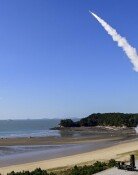Mass Amnesty to 6.5 Million People
Mass Amnesty to 6.5 Million People
Posted July. 16, 2005 03:05,
The Uri party has decided to ask President Roh Moo-hyun to grant mass amnesty to a total of 6.5 million people to mark the 60th anniversary of the nations liberation from Japanese colonial rule on August 15.
Park Byung-seok, head of a planning committee, said in a press conference in the headquarters of the party in Yeongdeungpo-gu, Seoul, In order to promote national unity and inject vitality into the economy, we decided to ask for mass amnesty including special amnesty to four million people, and general amnesty or similar measures to general amnesty to 2.5 million people.
If mass amnesty were granted to 6.5 million people, it would be the second biggest amnesty in Koreas history. During the Kim Young-sam administration in 1995, some seven million people were granted amnesty.
The Uri Party decided to request for the special amnesty for those who committed minor offences among ordinary peoples daily lives, for example, those who committed misdemeanors, violated administrative regulations and infringements of the Food Sanitation Act, and also to public safety offenders and election criminals prior to the 16th general election.
The party also decided to push for amnesty to 3.66 million people who received administrative punishments such as the suspension of ones drivers license, cancellation of a license and demerit points due to the violation of road traffic laws.
However, those who were punished with the suspension of a drivers license and the cancellation of a drivers license due to drunk driving, whose numbers are 55,000 and 18,000, respectively, criminals who used their cars to commit crimes, hit and-run car drivers, mentally deranged people and those who faked a drivers license are excluded from the amnesty.
Park said, After some examination, we will decide within the month whether we will ask the president for the granting of amnesty to politicians who received illegal presidential election money.
He added, Public servants who were involved in scandals, businessmen including venture businessmen and politicians might be subject to the mass amnesty, but it has not been decided yet, suggesting that the party is considering asking for the amnesty to politicians who have received bribes.
When asked about the scope of the recipients of the general amnesty, the Uri Party replied that the subjects will be those who have been punished by a penalty of less than five years prior to the upcoming August 10 due to the violation of minor administrative laws such as the homeland reserve forces establishment law, the civil defense basic law, the resident registration law, the labor standard law, the state pension law, the atmospheric environment preservation act and the water quality preservation law. However, the party gave no detail on the number of people involved with each of these laws.
The president can grant special amnesty after deliberation of the State Council according to the report to a superior by the Minister of Justice, and a general amnesty requires the consent of the National Assembly.
Park said, The session of the National Assembly before our countrys liberation day is not planned, but the general amnesty in 1995 was promulgated on December 2. He said that on August 15, the party would examine the measure to declare the mass amnesty, and after that, make it public and seek the consent of the National Assembly.
However, it seems there will be a controversy over whether the measure of declaring the amnesty first and seeking the consent of the National Assembly later is proper or not.
Regarding possible controversy over the measure, Choi In-ho, a deputy spokesperson of Cheong Wa Dae, said, When the Uri party formally asks for the amnesty, Cheong Wa Dae will examine it specifically, but the scope of the amnesty has yet to be determined.
Yong-Gwan Jung In-Jik Cho yongari@donga.com cij1999@donga.com







